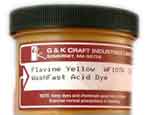What kind of dye will work to change a cashmere cardigan from pink to black?
What kind of dye will work to change a cashmere cardigan from pink to black?
Name: Mary
Country or region: UK
—ADVERTISEMENTS—
Washfast Acid dyes
at Paradise Fibers

Washfast Acid dyes
Also known as Nylomine dyes, excellent for use on nylon. One ounce of dye will dye six pounds of fiber!
at Paradise Fibers

Washfast Acid dyes
Also known as Nylomine dyes, excellent for use on nylon. One ounce of dye will dye six pounds of fiber!
Message: Hi there,
I have a pink colour pure cashmere cardigan that I hate its colour. I want to dye it dark black. Do you sell washfast very dark black that after dyeing the cardigan doesn't fade? How much is it? I live in York, UK.
I will try not to change the temperature suddenly so that my cardigan doesn’t felt. Do you think it will shrink?
There's a very real risk that your cashmere cardigan will shrink when you dye it. Being careful to avoid agitation and sudden temperature changes will help, but it won't guarantee that the sweater will still fit you after you dye it. Because of this risk, I recommend that you try dyeing this sweater only if you would otherwise discard it.
I don't think you should purchase dye through the affiliate links on my site, because they are through US companies only. If you look under the "Europe" subheading on my page, Sources for Dyeing Supplies Around the World, you will see several different dye suppliers that are located in the UK, which would be more suitable sources for you. If you do choose to order dyes from the US, PRO Chemical & Dye has the widest range of different kinds of dyes for wool, and they do ship to the UK. Kraftkolour in Australia has an even wider variety of dyes, but higher prices.
There are several different types of acid dyes that are suitable for hand-dyeing cashmere. The most washfast (resistant to fading in the laundry) are from a category of acid dyes which is variously known as premetallised acid dyes, premetalized acid dyes, or metal complex dyes. Another type of acid dyes, the acid milling dyes, is less washfast than premetalized acid dyes, but much more washfast than acid leveling dyes. The less washfast types of acid dyes can be satisfactory if you either always dry-clean the item, or launder it only by hand, in cool water.
In the UK, a good source for acid dyes for hand dyeing is George Weil; their acid dyes are probably of the acid milling type. Another good UK source of dyes in suitably small quantities is Kemtex. See my page of dye suppliers for contact information for these and other UK sources for acid dyes.
Lanaset Jet Black is a very satisfactory blend of two premetalized acid dyes, but it's difficult to obtain in the UK. (See my earlier blog post, answering "Do you know of a supplier for Lanaset dyes in the UK?".) ProChem's Wash Fast Black is also very satisfactory, as it contains one of the two premetalized acid dyes found in the Lanaset Jet Black. (See my Dye Forum post, "Lanaset Jet Black contains Washfast Acid Jet Black WF672 plus another black dye".) Kraftkolour, in Australia, is a good source of both premetallised dyes and Lanaset dyes.
Kraftkolour also sells Lanasol reactive dyes for wool, which can be used at a lower temperature, with an additive that they call "Cold Wool S". The low temperature would be very desirable for reducing the risk of shrinkage and felting, and they are highly washfast, even when laundered under harsh conditions. See their instruction sheet, "Cold dyeing system for wool and silk & other protein fibres" [PDF]. These dyes react with the proteins in wool fibers, just as Procion MX and other reactive dyes react with cotton and silk, but they do not require the high alkaline pH that Procion dyes require, in order to properly react, so they are far more suitable for wool. (Procion dyes can also be used with a low acid pH, instead, by substituting vinegar or citric acid for the soda ash normally used with them, but under those conditions they act as acid dyes, not as reactive dyes, so that the chemical bonds holding them to the fiber are significantly less strong.)
(Please help support this web site. Thank you.)
(Please help support this web site. Thank you.)
Posted: Thursday - June 23, 2011 at 11:15 AM
Follow this blog on twitter here.
Quick Links
- All About Dyes & Dyeing Top -
- Top of this blog -
- FAQ -
- The Dye Forum -
- How to Tie Dye - How to Batik -
- Books - Toys - Plants -
- Top of this blog -
- FAQ -
- The Dye Forum -
- How to Tie Dye - How to Batik -
- Books - Toys - Plants -
More in this category:
- -
Statistics
Total entries in this blog:
Total entries in this category:
Published On: Aug 29, 2012 02:49 PM
Total entries in this category:
Published On: Aug 29, 2012 02:49 PM